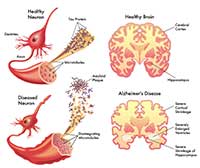 A form of dementia, Alzheimer’s is the most common form. This disease develops slowly and worsens over time. The majority of patients with Alzheimer’s are 65 years of age or older, although up to five percent of patients with the disease develop early onset Alzheimer’s in their 40s or 50s. The disease is caused by the destruction and death of nerve cells.
A form of dementia, Alzheimer’s is the most common form. This disease develops slowly and worsens over time. The majority of patients with Alzheimer’s are 65 years of age or older, although up to five percent of patients with the disease develop early onset Alzheimer’s in their 40s or 50s. The disease is caused by the destruction and death of nerve cells.
Symptoms: Alzheimer’s is characterized by memory and thinking problems that disrupt everyday life. For example, a patient with Alzheimer’s may have trouble driving to a familiar location or lose track of the passage of time. Usually, the first symptom is trouble remembering new information, because Alzheimer’s affects the area of the brain responsible for learning first. As the disease progresses more serious symptoms arise, such as confusion, disorientation, mood and behavior changes, unfounded suspicions of loved ones, and difficulty speaking and walking.

Treatments: There is no current cure for Alzheimer’s, although research continues. Instead, patients rely on treatments to manage symptoms in order to improve quality of life. Some medications, like cholinesterase inhibitors and memantine, can help with cognitive changes.
It also helps to adapt the living situation of a patient with Alzheimer’s. Some tips include establishing routine habits, keeping valuables in the same place, removing excess clutter, installing handrails. Regular exercise is also important, as well as a healthy diet, because many Alzheimer’s patients forget to eat or drink.




